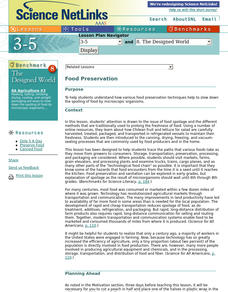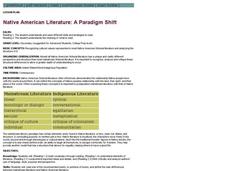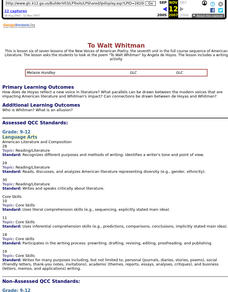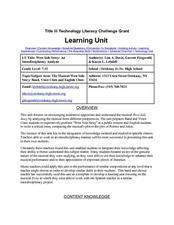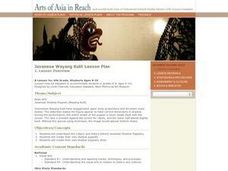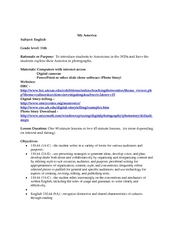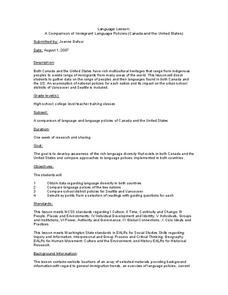Curated OER
Folktales (African American, Chinese, Japanese and Korean)
Students participate in a variety of activities that are concerned with comparing different cultures through the literary genre of folktales. The stories are used to stimulate student interest and provide a context for how a society...
Curated OER
How Does Ancestry Affect Folklore?
Students break into groups of 4 or 5 and choose an option to demonstrate a different cultural perspective in a fairy tale or other folklore that they are familiar. Possible choices are: PowerPoint presentation, video, digital...
Curated OER
Sorting
Students explore how books are sorted in a library. In this sorting lesson, students play a game where they have to fill the shelves with books that share a common theme. Students compare this game to a real library. Students discuss how...
Curated OER
Native American Literature: A Paradigm Shift
Learners explore Native American literature. In this cultural diversity lesson plan, students read selected Native American books and analyze the themes of the books and familiarize themselves with the vocabulary used in the books.
Curated OER
To Walt Whitman
Students examine the poem To Walt Whitman by Angela de Hoyos. They divide into groups. Each group creates a poem written from one of two perspectives: to Walt Whitman or to de Hoyos from Whitman.
Curated OER
King Arthur's Family Tree
Students examine the genealogy of King Arthur. They create a poster of his family tree and shares with the class. They also place other key figures of the time period on the poster to put his life in perspective.
Curated OER
Nature Walk Poem
Third graders read poetry inspired by nature. They talk a walk in nature or in their neighborhood with paper and pen and write down feelings and perceptions. They write a poem about their walk and share it with the class.
Curated OER
Make it Snow
Sixth graders investigate snow using pieces of literature, experimentation, and studying images by Wilson Bentley. They view snow from its artistic, geometric and literary expressions.
Curated OER
Killing Fields
Students view a television program that explores people's perceptions and expectations in war prior to and after WWI. They discuss the effects of trench warfare and write a journal entry or short oral report reflecting on their...
Curated OER
Guerilla Warfare
Students view a television program comparing conventional and guerilla warfare. They compare and contrast guerilla movements in Cuba, Vietnam and Afghanistan. Students also consider the American Revolutionary War from the perspective of...
Curated OER
American Transcendentalism and Buddhism:
Students study American transcendentalism through readings of Emerson and Thoreau. They make cognitive connections to the similarities to Buddhism in these writings. The connection of the literary movement is explained in the art of the...
Curated OER
How Can We Keep Our Forests Intact and Have Our Chocolate Too?
Fourth graders explore various methods of growing and harvesting rainforest foods in order to sustain its biodiversity. They discuss the various uses for trees from several viewpoints. Students research chocolate demand and land use...
Curated OER
Electric Light Tower
Students examine the San Jose Light Tower as an example of the development of urban lighting circa 1900. They view a slideshow, conduct research and write newspapers to chronicle the lighting ceremony from a variety of perspectives.
Curated OER
Javanese Wayang Kulit Lesson Plan
Fourth graders study the history and culture associated with Javanese Shadow Puppets and the perspective that is used during performances. They design original shadow puppets and give a shadow puppet performance using their creations.
Curated OER
The Eighty Yard Run
Learners read and explore the themes of the book The Eighty Yard Run. In this literature lesson, students discuss their observations and predictions. Learners develop their own story which is similar to that of The Eighty Yard Run.
Curated OER
My America
Eleventh graders compare 1920's America to modern America. In this historical perspectives lesson, 11th graders research both eras in American history using inquiry skills. As a culminating activity, students create digital slide shows...
Curated OER
House on Mango Street
Young scholars complete a guided reading study and autobiographical essay for Sandra Cisneros' House on Mango Street. In this literary analysis lesson, students read the novel, complete novel response activities, book review worksheets,...
Curated OER
A Comparison of Immigrant Language Policies (Canada and the United States)
Students explore the linguistic backgrounds that have shaped the cultural perspectives of Canada and the United States. In this cultural comparison lesson, students create a class presentation that reflects the similarities and...
Curated OER
The Space Race in the '50's
Students explore the impact of the space race. In this 1950's America lesson, students examine newspapers from the time period as well as Apollo mission episodes. Students then create journals from the perspectives of Apollo astronauts.
Curated OER
Anne Carson
Students read poetry and a biography of poet Anne Carson as part of a creative writing lesson. In this poetry analysis lesson, students read about the poet, read her poetry, and analyze a photograph to then write a poem. Students write...
Curated OER
Novel Lesson 5
Students take a closer look at the horrors of war. In this Vietnam instructional activity, students read Fallen Angels by Walter Dean Myers, participate in literature circle discussion about the novel, and complete a final project based...
Curated OER
The International Monetary Fund, The World Bank, and the World Trade Organization: A Help or Hindrance to Developing Countries?
Eleventh graders study the International Monetary Fund, World Bank, and World Trade Organization. They collaborate in small groups to research and explore perspectives of each group, identify objectives of each group and key arguments...
Curated OER
Truthfulness
Students investigate the concept of truthfulness. They practice the skill through seeing how truth is seen from other perspectives. Students are given a quotation to consider and spend time brainstorming with others about its meaning.
Novelinks
Roll of Thunder, Hear My Cry: Concept/Vocab Analysis
Considering using Roll of Thunder, Hear My Cry for book circles or whole-class study? First time teachers, and those who have used the text before, will find some interesting tidbits in this overview.


